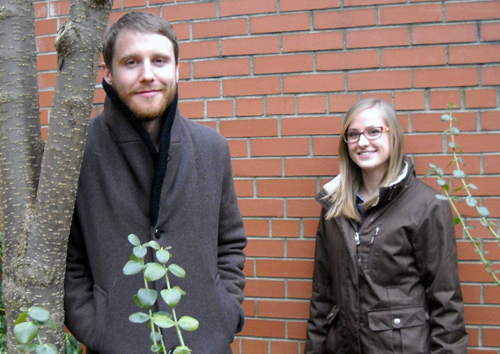
Helping to tackle vitamin D deficiency and improve adaptation to climate change are the research goals of two U of G students receiving 2013 grants from the Landscape Architecture Canada Foundation (LACF). Victoria Cox and Jonathan Epp will use their $1,500 awards while completing master of landscape architecture degrees this year in the School of Environmental Design and Rural Development (SEDRD).
Their grants were among nine professional and student awards from the foundation this year. Both student awards came to Guelph, says Prof. Robert Brown, who is Cox’s thesis adviser: “It shows we’re the top research program in Canada.”
Cox hopes to help balance harmful and helpful exposures to ultraviolet B (UVB) radiation from the sun. Increasing skin cancer rates have prompted landscape architects to look at how to use shade to limit damage from over-exposure. But she says we also need sunlight to produce vitamin D, particularly during winter.
North American researchers have looked at the effects of shade planting in spring and summer. Cox says less is known about UV radiation effects in winter, particularly in northern latitudes. She aims to help refine computer models to help professionals track UVB levels in different landscapes and will outfit schoolchildren in Waterloo, Ont., with dosimeters to record amounts of ultraviolet radiation.
Originally from Oakville, Ont., Cox completed a geography undergrad and a studio art minor at Guelph. She worked with Brown on a shade guideline project for the Region of Waterloo.
That work has widened her research interests. “I’ve learned a lot by reading medical journals. It’s important for our profession to go outside the scope of the discipline.”
For his project, Epp will draw on his southern Saskatchewan roots to look at climate change effects and adaptation in semiarid landscapes. He grew up in Herbert, near Swift Current, which has endured periodic droughts.
“The project involves our continued story of adaptation and how anthropogenic climate change might affect us,” he says. Comparing recent dry periods with Depression-era conditions, he says the droughts in 2001 and 2002 were worse than in the “Dirty Thirties,” but we have adapted.
He will look at climate records and land use data from geographic information systems (GIS). By integrating data and finding effective ways to visually communicate that information, Epp hopes to help balance environmental and human needs in the region.
He says landscape architects bring cross-disciplinary skills – from analyzing GIS data to understanding the psychology of communication – to such projects.
Epp completed a BA at the University of Regina in 2005. His Guelph adviser is Prof. Karen Landman. She says, “Jonathan is hoping to translate scientific knowledge into a form that helps people understand what it means to them in their landscape, and that helps them make decisions for more sustainable practices in that landscape.”
The LACF grants are intended to support research, communication and scholarship, adds Prof. Cecelia Paine, a SEDRD faculty member and president of the foundation. In a news release about the awards, she says, “The foundation is proud to support these exemplary projects that reflect the expanding role landscapes play in providing social, ecological and economic benefits to society. We look forward to the proponents sharing the results of their work through online resources and print publication, thus multiplying the impact of each grant.”